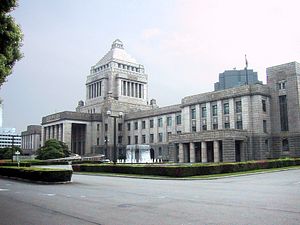The legal structure governing Japan’s use of force continues to evolve, albeit slowly. The process deserves more attention, especially in light of the uncertainty of U.S. policy toward the Indo-Pacific, and of the growing power and assertiveness of the People’s Republic of China. The increasingly expansive scope of Japan’s military authority is both the reflection of changes in the regional strategic environment, and potentially a driver of those changes in the future.
The process of reform and reconceptualization of defense authority in Japan has proceeded slowly, and along multiple axes of advance. Direct constitutional reform remains on the table, but legislative and interpretive shifts have also affected how the government thinks about its authority to deploy military forces. Craig Martin details the changes (from two years ago) in Japan’s national security laws; Masahiro Kurosaki (an associate professor at the National Defense Academy of Japan’s Ministry of Defense) works through some of the international implications in a post at Lawfare.
As Kurosaki suggests, constraints on Japan’s use of force remain; Japan can only use force in response to existential threat, it must use minimal force to accomplish its goals, it cannot deploy forces within the territorial borders of other states, and yet it can undertake positive defenses of “commons” such as air, maritime, cyber, and space. Separately these sound like significant constraints, but each allows a considerable degree of latitude. For example, “existential threat” can be defined down to the extent that it represent a threat to the prosperity and livelihood of the Japanese people, which obviously allows an enormous degree of wiggle room.
Nevertheless, even these changes allow Japan to act more assertively as a coalition partner in its region. This means acting in either a direct or supportive role for allies or coalition partners threatened by China (or some other international actor). The reasons for such a shift lay in both the increasing power of China, and in uncertainty about the United States. Regarding the latter, there is cause for concern; for the last 20 years, the United States has alternately adopted strategies of accommodation, mild balancing, and multifaceted confrontation toward China. Steps towards retrenchment, from the current or any future administration, could leave Japan swinging in an uncertain wind.
None of this represents a conclusive argument that Japan ought to take steps to reinterpret (or even revise) its constitutional prohibitions on the use of force. The rest of the region has a vote of sorts, and could react poorly to an increasingly assertive Tokyo. However, the structural and diplomatic conditions that undergirded the peace Japan has depended upon since 1945 appear to be changing in significant ways. The means through which Japan could exert influence and attempt to achieve its strategic ends may not be tenable under these new strategic conditions.
Long story short, to act as one of the corners of a new security architecture in the Indo-Pacific, Japan needs to adopt a more assertive understanding of its capacity to use military force. This is, of course, rather different than suggesting that Japan should adopt such an understanding; there are ethical and cultural reasons for rejecting this entire shift. But Japan’s decisions will have a broad and deep effect on the politics of the Indo-Pacific region.
The views expressed here are the author’s personal views and do not necessarily reflect those of the Department of Defense, the U.S. Army, the Army War College, or any other department or agency of the U.S. government.

































